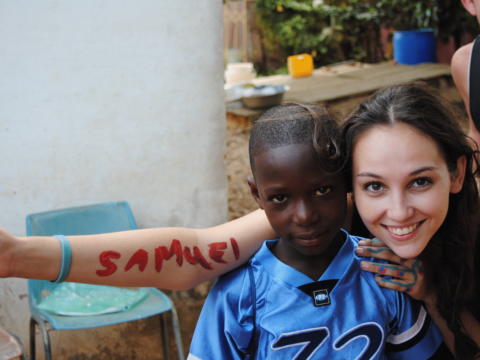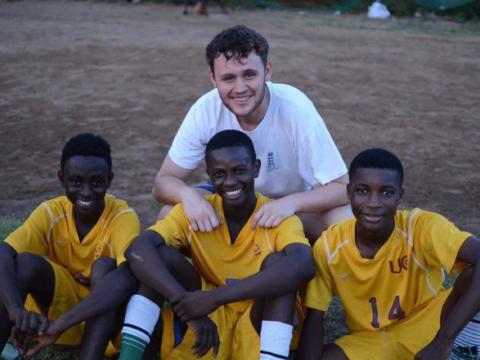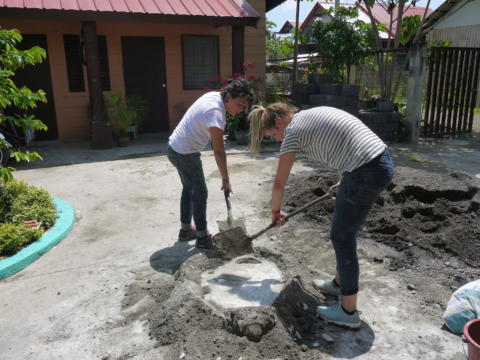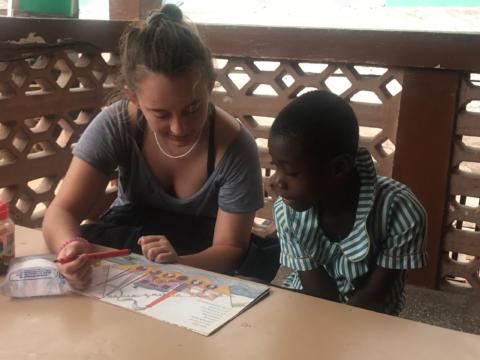Only 225€ per week!
Art & Design Experience
Accra - Ghana
Why not have your art and teach it too? In this program, you get the best of both worlds because you can share your skills and learn from others as well!
If you are all about your ART and DESIGN, then this is the perfect program for you. This is actually the best opportunity, because you get to give and receive. You will share your artistic talents with local Ghanaian children and then swap places to become a student, learning from local Ghanaian artisans. Talk about a win-win situation!
Program Description
What a way to spend your time! If your passion for Art and Design is through the roof and you desire to share your unique gifts with the world, then this program is tailor-made for you. During your program you will get to help run Art Clubs in local schools, using any number of different mediums. Your efforts will be helping local children use their own creative abilities to express themselves and produce their own works of art that they can be proud of.
Most times you can choose the age group you’d prefer to work with. You can develop a syllabus for your class and determine what the goal will be for your time together and then guide them through the steps to getting those targeted outcomes met. With some encouragement and direction from you, they may even be able to have an exhibition to showcase their work. Overall, this enriching experience can help them to build their own level of confidence in their skills and ability and even give them the nudge needed to pursue their artistic dreams. You will be helping to nurture that spark! The bonus is, that as they are learning from you, you will learn from them too. Through this program, which is a one-of-a-kind cultural exchange, all involved will be able to develop a unique bond.
The other great part of this program, is that you will also get to see local art and learn from the local artisans who are creating a vast array of art and design pieces. Just about anything you can imagine from batik on clothing and scarves, jewelry design, painting, photography, screen printing, sculpture to wood carving. The best part is that you will get the opportunity to get some hands-on, experiential learning. Discussions about the creative process will also yield a greater insight and likely a greater appreciation for the unique and stylistic qualities of African art. That additional knowledge may allow for comparing and contrasting with some of the Western style art you may already be familiar with.
It is important to note that time with local artists is subject to their availability. Keep in mind that there may be some additional costs involved for any additional materials (brushes, canvas, paint, etc.) that may be required for your participation.
Please be advised that the daily transportation costs to and from your program are not included and must therefore be paid by yourself throughout the course of your stay. Those costs may range from 2 – 5 Euros per day.
Aims & Objectives
- Deepen the artistic and creative expression of local children and yourself
- Broaden cultural interactions through learning and idea exchange
- Gain invaluable and practical experience in teaching
- Expand your knowledge of local customs, history, art and culture
Schedule
Monday to Friday
Your actual schedule may vary based upon availability of local artisans and the specific art club you will be working with. As an Art and Design program participant can expect your day to include activities such as:
- Breakfast at your accommodation. Depending upon your schedule, Lunch will be at your accommodation or you may be able to take a bag lunch with you. Dinner will be served at your accommodation each night.
- Using the syllabus you have created to integrate elements of art into the lives of young people whose exposure to art may be limited because of resource constraints and school curriculums that have few related options.
- Acting as teacher and mentor to keep the young artists’ projects on track.
- Using your skill and expertise to provide direction and encouragement, as they prepare their work for exhibition.
- Engaging with local artisans to learn about specific aspects of their crafts, as well as the history and culture of African art
Note: This schedule can be changed and/or amended depending on weather conditions, local conditions and unforeseen circumstances.
Participant Criteria & Requirements
Standard Requirements
Minimum age: –
Maximum age: –
Minimum English level: Basic
CRB required: On Signup
Passport copy required: No
Resume copy required: No
Required qualification: None
Additional Requirements
- Modest clothing (covering the knees and shoulders) is required while on school grounds.
Additional Equipment
There are no further requirements for this program.
Optional
- Art materials
Location
Accra is the capital and largest city in Ghana, with a population of over two million. Accra stretches along the Ghanaian Atlantic coast and extends north. Our accommodation is located in Teshie, a coastal suburban town on the east side of Accra. It is a quickly growing suburb that’s getting bigger and bigger every day. Teshie is rich in its diversity and has its own train station for easy transport.
About the Accommodation
During your stay here in Ghana you will be accommodated at our center here in Accra. The accommodation is located within a gated community. Rooms are generally dorm style and are separated between male and female. Programs are located about 20 – 40 minutes away from the house and participants are responsible for their own transportation costs to and fro. Staff remains on site 7 days a week to assist participants.
Food Arrangements
Typical Ghanaian dishes mixed with western food will be served at the accommodation. Typical ghanaian food includes rice dishes, beans, fruits, vegetables, chicken, beef and fish.
Facilities
It is close to all amenities with the closest shops within a 15-20 minute walk. ATM is 15 minutes away by taxi. Restaurants and bars are 20 minute taxi ride.
Activities & Events
No scheduled activities outside the program.
Sights & Surroundings
Cape Coast
Lake Volta
Elmina Castle
Manhyia Palace
National Museum of Ghana
Kwame Nkrumah National Park
Accra Mall
Bojo Beach
Aburi Botanical Gardens
Transportation
From this location we do not provide free transport to other locations.
Quick Facts
Name: Republic of Ghana
Population: 27 million
Capital: Accra
Language: English
Currency: Ghana cedi (GH₵)
Time zone: GMT (UTC +0)
Country Information
This multicultural nation is in the western region of Africa, south of the Sahara. Bordered by the Togo in the east, Burkina Faso in the north, Ivory Coast in the west and the Gulf of Guinea and the Atlantic Ocean in the south. Ghana's President is both head of state and head of the government. They now have one of Africa's strongest economies, which together with their democratic political system have made them to a regional power in West Africa.
This country has succeeded in keeping its culture alive for centuries making it an amazing place to visit. Its diverse geography and ecology ranges from coastal savannahs to tropical jungles. Once known as the gold coast, Ghana is the second largest producer of gold in Africa and today Ghana is also the second largest producer of cocoa beans in the world.
Climate
Geographically speaking, Ghana is located only a few degrees north of the Equator, giving it a warm climate that is relatively mild for its latitude. There are two main seasons, but to be on the safe side, expect everyday to be hot and the humidity to be high. During rainy days it usually just rains for a short while, but occasionally it can rain for the entire day. Temperatures tend to hover around 22-30°C.
Wet season
The north experiences its rainy season from April to November. The south experiences two rainy seasons each year. The heaviest rain there is from April until June, and a lighter rain is possible during September and October. Rainfall ranges from 80 to 215 cm a year. You can still expect to experience hot days, in both the north and the south.
Dry season
Hot winds from the Sahara desert blow into the northern part of Ghana in late December and continues until mid-February, this is called Harmattan. Some years this can be pleasant, as it dims the sun and decreases the humidity. Other years a bad Harmattan day will look like a big London fog, except it’s dust. The Harmattan is more intense in the north and this is a perfect time for wildlife viewing as animals congregate at the water holes during this period. Since the coast is in the south, you will likely find even more humid weather than in the north.
Culture
There are over 100 ethnic groups living in Ghana. The largest are Akan (45%), Moshi-Dagbani (17%) and Ewe (14%). The Ashanti tribe of Akan are the largest tribe and one of the few societies in West Africa where lineage is traced through the mother and maternal ancestors. They were once famous for their luxury and wealth rules, but today are more known for their craft-work.
The bond of family is very strong in Ghana and it is the primary source of identity, loyalty and responsibility. Family obligations take precedence over pretty much everything else in life. The entire family shares loss of honour, or the pride of success, which makes the culture a collective one. People are respected because of their age, experience, wealth and position. Therefore, you can always see preferential treatment for the eldest member in the group.
Gastronomy
The centuries old culture of Ghana has even managed to be reflected gastronomically! Most Ghanaian dishes are often served as thick stews or sauces with meat. It is common that dishes include home grown ingredients or local crops, even soups will contain some of the local groundnut or palm nut. Some stews and soups are tomato-based as tomato is another popular ingredient in the country. Most meals also include a starchy component such as boiled yams, rice or cassava as well.
Transportation
There are quite a few ways to travel in Ghana, although not all drivers are licensed. Insurance and registration stickers are displayed in the front windshield of all vehicles, so use your judgement on the condition and appearance of the vehicle and the driver. Keep in mind that most of the road accidents in Ghana are caused by tires that are in bad condition, so choose wisely!
Buses are recommended for long distance journeys. They provide the best balance between safety, price, speed and comfort. Be prepared to pay a bit extra for luggage. Tickets for the buses can be sold out, sometimes days in advance, so book your ticket ahead of time whenever possible. All taxis in Ghana have orange corners for easy recognition. Always ask for the price before jumping into the car, then offer him the half of that. After that, you can work together through negotiation to find a happy medium.





